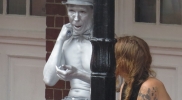|
|
Best Trivia - Philosophy
|
Favorite Trivia – PSYCHOLOGY & PSYCHIATRY
|
|
“A psychiatrist finds you cracked and leaves you broke.”
|
|
“What a lot he [Sigmund Freud] had to put up with. Did you know he had 22 operations for cancer of the throat? 22! They had to burn out his tonsils with a red hot iron, it was cigars that did it. And eventually he had to have an amputation.” [October 18, 1983]
Ian Breakwell’s Diary 1964-1985
|
|
“Neurosis is the real possession by the devil, the real evil force.” [December 27, 1942]
Mirages: The Unexpurgated Diary of Anaïs Nin, 1939-1947, edited by Paul Herron
|
|
psychiatrist: “A doctor who guarantees a cure or you get your mania back.”
Leonard Louis Levinson – Webster’s Unafraid Dictionary: 5,000 Defiant Definitive Put-Downs
|
|
“You’re insane, you’re sick, and what you say is sick!” [Hermes to Prometheus]
Prometheus Bound – Aeschylus (trans. by James Scully)
|
|
“The neurotic builds a castle in the air. The psychotic lives in it. And the psychiatrist collects the rent.”
|
|
“Nothing can be brought to an end in the unconscious; nothing is past or forgotten.”
David Baird – A Thousand Paths to Enlightenment
|
|
“The tragedy of life that Searles is referring to is the one we have been discussing: man’s finitude, his dread of death and of the overwhelmingness of life. The schizophrenic feels these more than anyone else because he has not been able to build the confident defenses that a person normally uses to deny them… Searles looks at schizophrenia precisely as the result of the inability to shut out terror, as a desperate style of living with terror… The creativity of people on the schizophrenic end of the human continuum is a creativity that springs from the inability to accept the standardized cultural denials of the real nature of experience. And the price of this kind of almost ‘extra human’ creativity is to live on the brink of madness, as men have long known. The schizophrenic is supremely creative in an almost extra-human sense because he is furthest from the animal: he lacks the secure instinctive programming of lower organisms; and he lacks the secure cultural programming of average men.”
Ernest Becker – The Denial of Death
|
|
“In the early 1970’s, I worked as an art therapist at a psychiatric hospital in Milwaukee. One day I overheard Betty, one of our patients with schizophrenia, say, ‘I’m just sick and tired of following my face around.'”
Sue Klebold – A Mother’s Reckoning: Living in the Aftermath of Tragedy
|
|
“It does not escape me that it is a cruel thing that the children should suffer for their parents’ misdeeds.” [Epistolae Ad Brutum., I, 12.]
Cicero
|
|
“I’d just had a strained session with the Ferrari doctor, where he heard the state of my head and leaped for the phone, eager to refer me to a psychopharmacologist… I threw a damper on his enthusiasm when I told him my Writer’s Guild insurance paid only fifteen dollars per psychiatric visit. Otherwise shrinks could bankrupt the guild in a matter of months.”
Paul Monette – Borrowed Time: An AIDS Memoir
|
|
“‘We spend all of our lives without ever really examining our past, our lives.’ He gives me a knowing smile. ‘Unless, of course, we write a memoir It’s either that or therapy. But even therapy can’t compare to writing a memoir. One memoir is about ten years’ worth of therapy.'”
Richard Blanco – The Prince of Los Cocuyos: A Miami Childhood (Melanie Brooks – Writing Hard Stories)
|
|
“While writing isn’t a substitute for therapy, informal personal writing can also add to the experience. In journalizing, for example, we write solely for ourselves, to explore feelings privately. Or we might compose letters (not necessarily to be sent!) to people who have hurt or abandoned us, affording us an opportunity to express feelings we could never say in person or in public. Freewriting to get our emotions down on the page as fast as possible, with no thought toward rewriting, publishing, or editing, is also a private, yet effective, form of communication to enhance our understanding of ourselves. Whether for an audience of many, or just one, through writing, I tell my story.”
Sue William Silverman – Fearless Confessions: A Writer’s Guide to Memoir
|
|
“Analysis taught me to think. Taught me to use my tendency to object to articulated ideas on my own ideas, taught me to use doubt, to examine my own speech for its evasions and excisions. It gave me an intellectual task capable of transforming paralysis—which is the extreme form of self-doubt—into insight.”
Louise Glück – Proofs & Theories: Essays on Poetry
|
|
“The function of a psychiatrist is to ask, ‘What are you thinking?’ or ‘Tell me your thoughts,’ as though anyone could do this… Thoughts surface and sink from moment to moment. And there is a risk in rummaging in the imagination. One is apt to turn up a memory so traumatic that one could not bear to think of it for decades… It had taken place beneath a great weeping beech tree whose branches hung their leaves in a circle to the ground. It was the perfect bower for concealment. I was twelve years old. My beloved father had died some months before. It was under the weeping beech that I had accepted the warm, dry hand of a smiling man in a clerical collar. The hand reached under my shirt, paused at the nipples, then reached on and down… ‘Father…’ I had managed. That terrible word. Minutes later the priest was gone and I saw myself clinging to the trunk of the tree, trembling with shame and guilt at what I had let happen, a secret I have kept all my life, telling no one. Now the old nail in my breast pricks me anew.”
Richard Selzer – Diary
|
|
“Whatever his weaknesses, it was Freud who ushered in the Age of Suspicion: we are today the undeceived, or the less deceived. We think we can see through façades, camouflage, the smokescreen of words, We are on the look-out for the willfully or uncounsciously withheld, the further or double meaning.”
Walter Redfern – Puns
|

Comments are closed.
|
|



























































